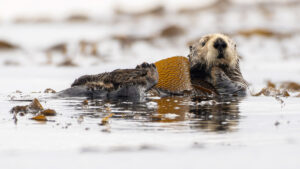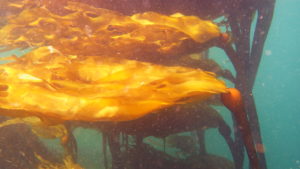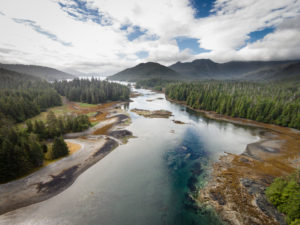
Returning Sea Otters are Transforming the BC Coast
If you’ve spent any time out on the BC coast recently you may have noticed something exciting that’s happening – the return of sea otters
Marine Mammals of Blackfish Sound and Johnstone Strait
The coastal waters around Northern Vancouver Island are exceptionally productive thanks to the region’s complex oceanography. As large tidal exchanges are squeezed through the many islets and narrow passages here, cold nutrient rich water is upwelled to the surface, fuelling diverse marine food webs. Small fishes feed on the resulting plankton blooms, and seabirds and vast numbers of humpback whales work in concert to feed on the fishes in spectacular fashion!
Additionally, the narrowing coastlines and island archipelagos here essentially form a huge funnel through which massive numbers of migrating Pacific salmon must pass through each year on their way to spawning rivers and streams… and their predators know this! Killer whales (Orcas), in particular, congregate here each summer and fall to feast on this ecological bounty, making this region one of the best places in the world to observe these iconic marine mammals in the wild. Guests will learn the fundamental differences between fish-eating “resident” killer whales, and mammal-eating “transient” killer whales, in part by using an underwater hydrophone to hear the distinct languages of these highly intelligent marine mammals.
Throughout all this marine mammal activity, we’ll also enjoy forests walks, intertidal explorations, sea kayaking, evening discussions, and fabulous chef-prepared meals. Traveling under sail at every opportunity, this expedition connects us to the remarkable marine wildlife of this region, the ecosystems that support them, and the Indigenous cultures that have thrived here for millenia.
Observe, photograph, listen to, and learn about the fascinating lives of killer whales and humpback whales as we sail silently through this remarkable region.
Explore and enjoy island archipelagos, current-swept passages, highly-productive marine ecosystems, and abundant marine wildlife, including whales, dolphins, porpoises, sea lions, sea otters, sea birds, eagles, and more.
Visit the U’Mista Cultural Centre in the Kwakwaka’wakw village of Alert Bay, and the Whale Interpretive Centre in Telegraph Cove.
Our Northern Vancouver Island expeditions take our guests of the one of the most biologically rich regions on the planet and focus on observing and learning about the abundant concentrations of marine mammals found here, including killer whales, humpback whales, Pacific white-sided dolphins, porpoises, seals, sea lions, and sea otters. Notably, the travel distances here are small, allowing us to maximum the time we spend viewing wildlife, sailing, exploring, and learning about the Indigenous cultural heritage of the Kwakwaka’wakw Awi’nagwis First Nations and Tribes, also known as Kwakiutl, meaning “those who speak Kwakwala”.
Our expedition departs from the Northern Vancouver Island community of Port McNeill, where we set sail for Johnstone Strait. As we cruise along the south shore of Hanson Island, we’re on the lookout for the orcas and other whales that frequent this region. Our knowledgeable guides will give us an introduction to the biology, ecology, and conservation of killer whales on the BC coast. We’ll enjoy sailing in the vicinity of the Robson Bight (Michael Bigg) Ecological Reserve, a unique protected area established in 1982 to protect key habitats for killer whales, specifically where the Northern Vancouver Island Resident Killer whales come to socialize and use the “rubbing beaches” found within the reserve.
Throughout our voyage we hope to encounter both the salmon-eating “resident” killer whales and the mammal-eating “transient or Biggs” killer whales engaged in such diverse behaviours as feeding, resting, socializing, travelling, breaching, spy hopping, and tail slapping. We’ll use our underwater hydrophone to listen to the vocalizations that killer whales use to communicate and locate prey. We plan to go on a beautiful forest walk up to “Eagle Eye,” an observation platform from which researchers study killer whales and Reserve Wardens monitor vessel activity in the vicinity of the Reserve and ensure that no unauthorized vessels enter it.
We’ll be sure to visit Blackney Passage, a hotspot for marine mammals and seabirds due to its active tidal currents. We’ll enter Blackfish Sound (“blackfish” being another name for killer whales) and scan the area for whale spouts and dorsal fins. Blackfish Sound has recently become an area where large numbers of humpback whales congregate and actively feed on the abundant forage fishes found here. We’ll learn about the spectacular recovery of humpback whales on the BC coast and hope to observe many of their exciting behaviours, including breaching, lunge feeding, and trap feeding. We’ll spend much of the day here sailing and exploring this highly productive area and viewing the whales, dolphins, porpoises, and other marine wildlife that we will inevitably encounter. Time permitting, we’ll also visit the Whale Interpretive Centre located in the historic boardwalk community of Telegraph Cove.
Sea otters are also making an incredible comeback in British Columbia and transforming kelp forest ecosystems in the process. Time and weather permitting, we’ll cruise and sail further west into Queen Charlotte Strait where we expect to encounter large rafts of these charismatic marine mammals and observe them in action. As sea otters consume vast quantities of sea urchins, they make way for the establishment of massive kelp forests which, in turn, support an amazing array of marine life. This region is also a great area for encountering killer whales, humpback whales, minke whales, as well as haul out sites for large populations of both California and Steller sea lions.
As we make our way back into eastern Queen Charlotte Strait today we’ll enjoy some fine sailing before anchoring in Alert Bay, home of the ‘Namgis First Nation. We’ll go ashore here to tour this remote coastal community and visit the U’mista Cultural Centre. The centerpiece of U’mista is the “Potlatch Collection”, which consists of an amazing collection of potlatch masks and regalia that were confiscated from the Kwakwaka’wakw in the early 1900s, as well as displays depicting the ethnobiology and origin stories of nearby Kwakwaka’waka villages. This visit provides and exceptional opportunity for learning about the First Nations cultural heritage, and recent history of Northern Vancouver Island, and Canada more broadly.
As we travel the short distance back to Port McNeill on our last morning we’ll be on the lookout for our last wildlife sightings – perhaps a lone minke whale, or a super-pod of Pacific white-sided dolphins! Upon arriving back in Port McNeill, we’ll disembark and say farewell to our new friends and the marine mammals of this spectacular region.

If you’ve spent any time out on the BC coast recently you may have noticed something exciting that’s happening – the return of sea otters

Chixuu Tll iinasdll: Nurturing Seafood to Grow In every region we explore on the BC coast we experience pockets of unique microclimates and ecosystems, each

The Haida Gwaii archipelago is situated approximately 100 km west of the mainland coast of British Columbia on the edge of the continental shelf, and

Thrilling experience, we enjoyed every minute, especially the wonderful immersion in the Outer Shores World. Life is all about experience & learning and we go away with much to think about. The food and care was so excellent. We felt in secure hands with our great crew. Excellent educational talks and information!

The Passing Cloud and crew combined with family, extraordinary wildlife, and this island paradise… amazing, unforgettable, soul filling…thank you!

Each expedition is different and unique, this one has been the trip of orcas and whales – lots of them! The only thing that seems constant is the spirt of Passing Cloud and her wonderful crews.

How to put it into words? Lovely people to be with. A trip with Russ and Volker would be amazing no matter where we went. Close encounters with the HB’s [humpback whales] and Blackfish [killer whales] were a highlight for me. So nice to sail with Russ again! And bioluminescence…sweet!. See you all again soon!

Good thing my bucket list included a family sailing trip! Thanks to the crew for making it all happen. Loved the million whales we views, among all the other sea creatures, as well as the kayaking, exploring, eating, swimming, learning, and just plain old relaxing. The Passing Cloud rules!

Date | Price | Status | Depart / End | Booking |
|---|---|---|---|---|
Oct 4-10 (6 nights) | $5,700 | WAITLIST | Port McNeill | Booking Inquiry |